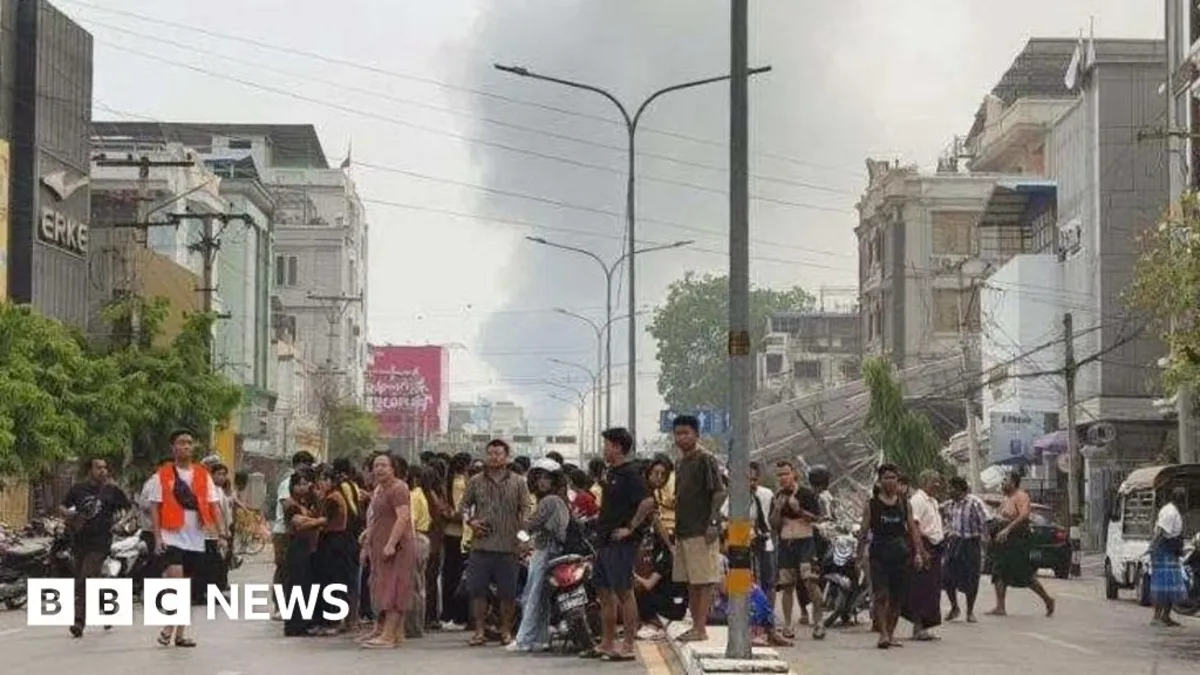
On Friday, a devastating 7.7-magnitude earthquake struck Myanmar and Thailand, leaving residents in both countries shaken and in shock. The tremors were so intense that they toppled buildings and caused chaos, particularly in Myanmar's largest city, Yangon. One anonymous resident shared his terrifying experience with the BBC, recounting how he awoke from a nap to find his building shaking violently. He reported that the seismic activity lasted around four minutes, during which he began receiving messages from friends indicating that the quake was felt in various locations across the country.
The earthquake's tremors extended beyond Myanmar, being felt in neighboring Thailand and even reaching parts of China. In Bangkok, the capital of Thailand, the quake led to the collapse of a 30-storey skyscraper, trapping 43 workers beneath the rubble. Panic ensued as residents rushed into the streets, with water splashing from rooftop swimming pools, adding to the sense of urgency and fear. Sirinya Nakuta, a resident in Bangkok, described the chaotic scene, saying, "It didn't stop. I heard things falling down from upstairs like stones hitting on us. I told my kids, we can't stay here and we have to get out of here. So we ran down."
As reports of destruction began to surface, Worapat Sukthai, the deputy police chief of Bang Sue district, revealed the frightening sounds of people trapped under the collapsed tower. He reported hearing cries for help and stated, "We estimate that hundreds are injured, but we are still determining the number of casualties." The full extent of the damage is still being assessed, with initial reports indicating a mass casualty area declared at Naypyidaw General Hospital. Patients were seen lying on gurneys outside, with intravenous drips hanging from makeshift stands, showcasing the dire situation.
The military junta that has been in control of Myanmar since a coup in 2021 made a rare appeal for international assistance, declaring a state of emergency across six regions. Junta chief Min Aung Hlaing was seen visiting the hospital in Naypyidaw, pleading for humanitarian aid from the international community. He stated, "We want the international community to send humanitarian aid as soon as possible." Access to information in Myanmar is challenging, with internet usage restricted and communication lines down, making it difficult for aid agencies to coordinate relief efforts.
In Bangkok, the earthquake caused significant disruptions, including the suspension of metro and rail services. Zsuzsanna Vari-Kovacs recounted her experience while waiting for a restaurant bill when she felt the earth shake. Initially thinking it was just her, she quickly realized the severity of the situation as others around her reacted. Deborah Punmachet, another resident, described a frightening moment when her recliner tipped over unexpectedly, resulting in her hitting her head on a table.
Bui Thu, a BBC journalist residing in Bangkok, noted that it had been over a decade since Thailand experienced such a powerful earthquake. Meanwhile, in Mandalay, Myanmar's second-largest city, social media images revealed extensive damage, including collapsed buildings and parts of the historic royal palace. A 90-year-old bridge crumbled, and sections of the main highway linking Yangon to Mandalay were torn apart, further complicating rescue efforts.
The United States Geological Survey (USGS) has issued a red alert, warning that high casualties and extensive damage are likely. While the official death toll remains uncertain, the USGS has estimated that it could be in the thousands, highlighting the urgent need for humanitarian assistance and emergency response efforts in the affected regions.